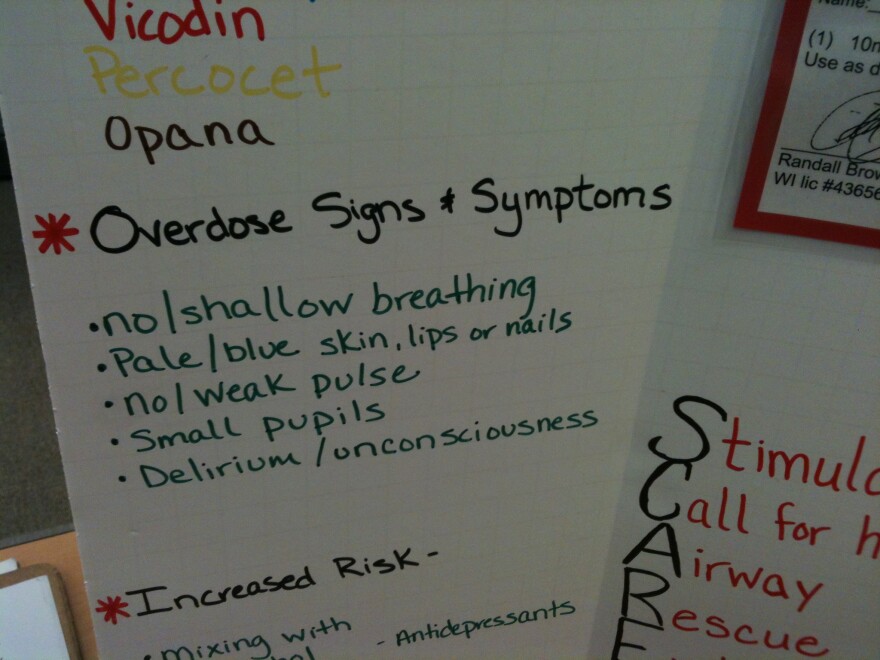Heroin has been devastating lives. In 2012, the illegal drug killed 199 people in Wisconsin, and crushed family and friends.
WUWM is beginning a series of reports on heroin abuse. One of the people we talked to was Matt, a 29-year-old who lives in Milwaukee. He’s in recovery, after using heroin for seven years. Matt did not want us to use his last name, because of the stigma of heroin abuse.
He admits that he once came close to overdosing.
“I vaguely remember it. I was with a buddy of mine, and we had just got copped from the drug dealer. And we drove around the block and we shot up, and all I remember next after that is I was out getting walked around in the neighborhood. He said I passed out in the car, I was barely breathing,” Matt says.

Matt says he began using heroin after years of taking painkillers, recreationally. He initially got a prescription for them in high school, for a football injury.
Capt. Anthony Smith is familiar with the story. He heads the Milwaukee Police Department’s narcotics division.
“Abuse of prescription opiate-based drugs is the gateway that we’re seeing to becoming addicted to heroin,” Smith says.
Smith says addicts often switch to heroin because it’s cheaper.
“To buy an 85 mg pill of OxyContin on the street, you’re talking sometimes anywhere between $50 and $100. It’s relatively expensive to support that habit. And they can go and buy a dose of heroin, get the same kind of effect for $10 or $20,” Smith says.
Smith says once someone starts using heroin, it’s hard to stop -- and every use carries risk. When a user overdoses, the Milwaukee Fire Department often gets the call. Capt. Michael Wright says paramedics look for tell-tale signs.
“Altered level of consciousness, basically they’re slurred or groggy, and the pupils will give it away,” Wright says.
Pupils the size of pinpricks, and skin beginning to turn blue, if the patient has gone too long, without breathing. Wright says heroin can essentially “disconnect” the signal between the respiratory system and brain.
Paramedics carry in their tool kit a drug called naloxone. Wright says it’s a “miracle drug,” because it can counteract the effects of heroin, when paramedics get to the patient before it’s too late.

“If we have an IV established, that’s going get the medication in their bloodstream faster than any other route. If not, sometimes we’ll give it intramuscular -- actually basically a shot in the arm -- and it takes a little while to absorb through the tissues to get into the bloodstream. But once it does, it’s pretty much instantaneous and people will wake up and pick up right where they left off,” Wright says.
For years, the AIDS Resource Center of Wisconsin has handed out needles, to prevent heroin users from spreading disease. Now, the center also distributes naloxone for free. Spokesman Scott Stokes shows what the center gives out: a set of five skinny syringes, each loaded with one dose of the life-saving drug.
“And what’s nice about this preloaded, is that when you have an overdose occurring it’s hectic, and if you get somebody that is a little bit impaired and then they’re trying to provide rescue breathing, trying to call 911 and then also loading a syringe out of a vial – I mean, it just gets out of hand. So the preloaded (syringe) really helps in that regard, because they don’t have to fumble around,” Stokes says.
Stokes says on occasion, people who don’t have naloxone take individuals who’ve overdosed right to the center’s door on W. Wisconsin Ave. The staff will administer the life-saving drug.
Stokes acknowledges that some may think the center is enabling heroin users. He doesn’t see it that way.

“You know, I’m all in favor of consequences for behavior, like if it comes to driving while intoxicated, the consequence is you take their license away, (but) when it comes to opiate overdose, the consequence is death,” Stokes says.
There are other efforts to try to make heroin use slightly less dangerous for people who are addicted. For instance, online videos. A YouTube posting actually shows someone injecting the drug, and gives tips on avoiding infection.
No matter what precautions drug users take, heroin addicts and often kills. Police Capt. Anthony Smith considers it a public health issue. He asks: “How many bodies have to hit the ground, before it falls out of fashion?”








